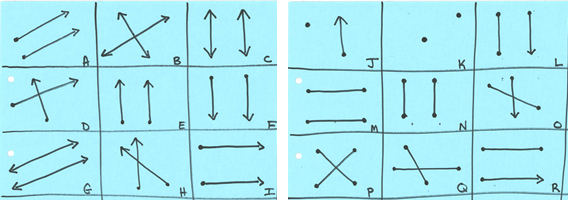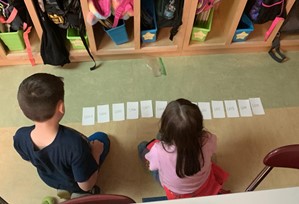February 16, 2021

 This is the sixth in a series of guest blogs by the 2020-21 Michigan Regional Teachers of the Year. Chelsee Schram is second-grade teacher at Laingsburg Elementary, Laingsburg Community School District.
This is the sixth in a series of guest blogs by the 2020-21 Michigan Regional Teachers of the Year. Chelsee Schram is second-grade teacher at Laingsburg Elementary, Laingsburg Community School District.
When did it become socially acceptable to be bad at math?
I’ve overheard educators, parents, students and random people on the street joke about being bad at math. I am not advocating that people should feel bad about struggling with math. I am, however, advocating that as a society, we cannot simply be OK with so many people struggling.
I challenge my fellow educators to create meaningful math moments for students. Let’s break the cycle of struggle.
“I did then what I knew how to do. Now that I know better, I do better.” – Maya Angelou
As mathematical educators, the first step we need to take is to inventory how comfortable we feel teaching math. It is OK to feel uncomfortable teaching math! For many schools, math has not been the primary focus of professional development. Because of this, many teachers have to look elsewhere to find support.
During recent challenges related to COVID-19, the Michigan Department of Education in conjunction with
Math Recovery has put out many professional development resources and activities to do in your classroom. The
MiSTEM Network- Southwest Region has put out amazing, easy-to-use resources for teachers both trained and untrained.
Dr. Jo Boaler’s YouCubed
website has research, professional development opportunities and classroom activities. Her paper “
Fluency Without Fear” has been a professional life-changer for me! I have replaced “skill and drill” with targeted fact fluency games. Here is one quote that impacted me the most:
“The researchers concluded that low achievers are often low achievers not because they know less, but because they don’t use numbers flexibly. They have been set on the wrong path, often from an early age, of trying to memorize methods instead of interacting with numbers flexibly.”
This quote helped shape how I plan math lessons. My goal for every lesson is to allow students to interact with numbers.

When planning, I find it helpful to think of math as an experience and less of a list of rules and procedures. The days of standing in front of the class and teaching math procedures have to be a thing of the past. Students (of all ages) need to have hands-on experiences that foster problem solving. I use
this resource from the Kentucky Department of Education to launch many lessons, as well as assess student progress.
I have also used our curriculum to guide creating problem solving tasks. When creating your own tasks, it is critical that you ensure there are multiple entry points for students, and there is more than one way to solve the task.
CMAT, Math Shell and
Inside Mathematics also have easy-to-use lessons that help create a positive mathematical experience for students of all abilities.
I really enjoy the podcast and websites of
Build Math Minds and
Making Math Moments that Matter. Both podcasts give me quick and easy ideas to improve math instruction, regardless of the curriculum.
Myself and four other ladies from my area have created a group called Mid-Michigan Math Ladies. We host virtual professional development evenings and share classroom-vetted resources. You can find the resources we’ve used or created on our Facebook page and the newly developed
MiSTEM Region 7 website.
At the top of this column is a math sort I created to introduce a variety of second grade geometry concepts.
I am confident that over the next few years Michigan educators will move toward replacing memorization and regurgitation with meaningful mathematical moments. It is my dream that by time I retire, it will no longer be socially acceptable to be bad at math.
Please feel free to contact me or any of the Mid-Michigan Math Ladies at
Midmichiganmathladies@gmail.com.